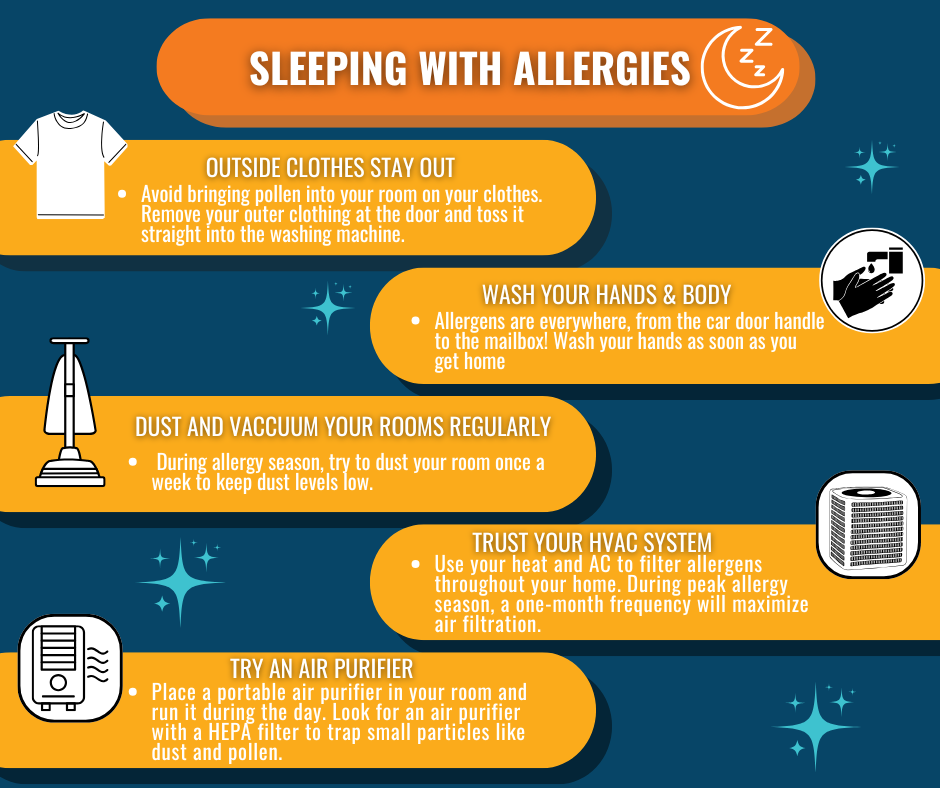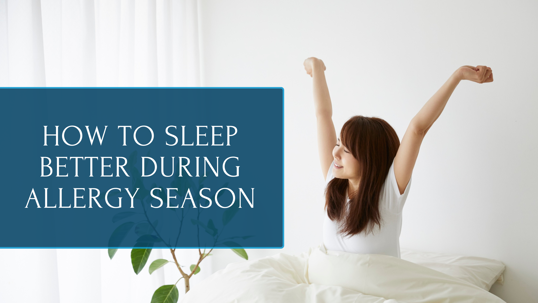People who suffer from allergies in Ocean Isle are all too familiar with the challenges of nighttime symptoms like wheezing, coughing, and restless tossing and turning. This is particularly true during peak spring and early fall allergy season.
Reducing exposure to allergens is critical to sleeping better. Learn how to get a better night’s sleep with a few simple adjustments to your routines.

![]()
Why Do Allergy Symptoms Get Worse at Night?
Increasing histamine levels, settling particulates, and body position worsen allergy symptoms at night. Unfortunately, poor-quality sleep leads to daytime fatigue and potentially an increased risk ofdeveloping sleep disorders.
Typically, your home’s air filtration system keeps these particulate levels low, reducing symptoms for those allergic to seasonal or indoor allergens. But during peak season, you may need to augment it with a stand-alone air purifier and allergen-reducing habits.
Six Strategies for Sleeping Better During Allergy Season
- Keep pollen out. During allergy season, keep windows and doors closed, especially from late morning to early evening when pollen levels peak.
- Shower at the end of each day. When you get home, remove your outer layers of clothing at the door and shower to get pollen off your skin and hair.
- Prevent dust accumulation in your bedroom. Dust and vacuum your bedroom weekly to stay ahead of dust, pollen, and other contaminants. You may need to dust your bedroom every other day if you have severe allergies.
- Keep pets out of your bedroom. Pet hair and dander are two of the most common indoor allergens. You can reduce your exposure by providing your pet with a cozy place to sleep in a separate room (or at least on the bedroom floor). And don’t forget to wash your pet’s bedding frequently!
- Maintain your HVAC system. A well-maintained HVAC system is the most effective tool for filtering particulates from the air inside your home. Maintain your unit annually and replace the filter at least every 1-3 months for maximum efficiency.
- Use an air purifier. Stand-alone air purifiers augment the filters built into your HVAC system. Add a HEPA filter air purifier to your routine to remove allergens from your home's air.
Where Should I Place My Air Purifier in My Bedroom?
Air purifier placement is critical to maximize the unit’s efficacy. Place it on a small, sturdy box near the middle of your room to promote airflow.
Read More: Ways to Improve Indoor Air Quality
Does Sleeping with a Humidifier Help Allergies?
Some individuals benefit from using a humidifier for allergies, but it’s not a universal solution. A portable humidifier can thin out mucus and moisturize nasal passages, making breathing easier. However, too much humidity can promote mold and mildew growth, worsening allergies. Keep your home’s humidity between 30% and 50% for optimal indoor air quality.
Take On Allergy Season with Help from A+ Heating & Cooling—Electrical
A+ Heating & Cooling—Electrical is your partner for home electrical, HVAC, and indoor air quality services in the Ocean Isle and Southport areas. Our experienced professionals are here to help you sleep better through improvements in indoor air quality.
Contact us online or call 910-600-6025 to schedule an appointment!
